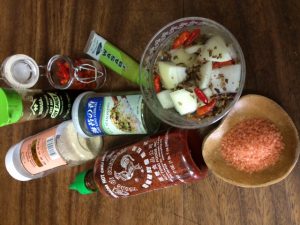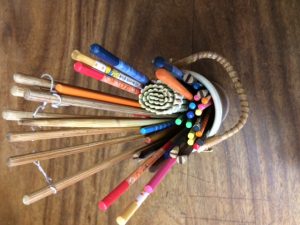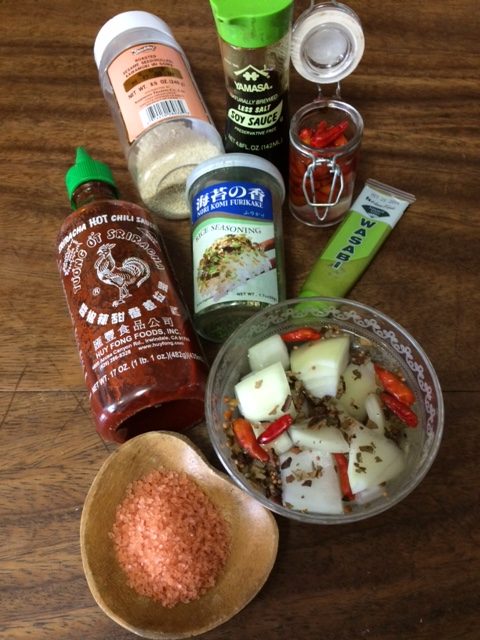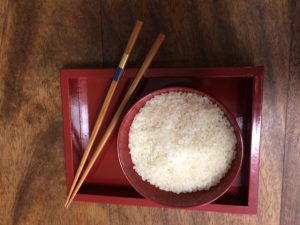Is this you? If so, you just might be a local.
Whenever you cook, you cook too much.
There’s a rice cooker on your counter.
When it’s time to cook, you wash the rice. Because there’s always rice.
You put small-kine vinegar in the rice water (so the cooked rice lasts longer at room temperature). You never salt the rice.
You take food to your neighbors. You let them pick your fruit. You give them vegetables from your garden.
The condiments you leave on the table are shoyu in a little carafe capped in yellow or green plastic and homemade chili peppa wattah in an old ketchup bottle. Maybe pickled onion, takuwan, kimchee, Chinese mustard, Sriracha. Maybe a bottle or vase that acts as a hashi holder. (Hashi=chopsticks, not to be mistaken for hadash=barefoot.)
Your dining room table might be permanently in the carport, covered with a vinyl “cloth”. When you give parties, that’s definitely where it is, perhaps extended with the aid of a blue tarp roof and some picnic tables from the mess in the garage.

Table condiments: Forget plain salt and pepper — expect chili peppah wattah, Portuguese pickled onions and more.
You know what day the poi comes into your grocery store, what day Longs gets the Donna’s cookies, which shops always have the Roselani haupia ice cream, which ones make good poke and know how to handle fish.
You store uneaten poi—which you rarely have—in a calabash with a slick of water on top. You don’t refrigerate poi unless it’s actually bubbling.
When neighbors bring food to you, you send the container back a short while later, filled with something good.
You buy party trays in thigh-high stacks at Costco or Sam’s Club. Sectioned paper plates and tapa pattern poi bowls ditto.
There’s always something on the stove; there is nothing impolite about helping yourself.

My hashi holder: a wedding gift of 30 years ago; any Hawaii kitchen needs lots of Asian tools, such as extra-long chopsticks, wire strainers, rice paddles.You cook with foot-long chopsticks and not-so-secretly find people who fumble with chopsticks to be hilarious.
You think storing sushi in a warmer or refrigerator is a sign of the end times.
Your babies were raised on poi.
When someone says “Come! Eat!” you eat, even if you’re not hungry.
You don’t talk business over food.
When you leave, you “make plate” without shame.
You never take wine, flowers or a “hostess gift” to parties; you take food.
When someone brings food, you serve it, even if it doesn’t “go” with what you are serving.
You cook barefoot or in house slippers.
At parties, even if you don’t pray over the food every other day, you “pule kakou,” joining hands and ending with the Doxology in Hawaiian or “Hawaii Aloha.”
You serve fruit punch for the kids. Kids and elders are served first. The Mamas eat when everyone else is back outside playing or talking.
You own one or all of these: A hibachi. A propane tank hooked to a grill outfitted with a wok ring the size of an infant bathtub. A machete. A sickle. A butt-size coconut grinder. A really grungy-looking grill on which Daddy or Uncle make the best pulehu meat anywhere. (Every family had at least one male who was legendary for something: his kal bi, his kulolo, his fish laulau.
Sometimes, when Daddy has a good day, there are he’e drying on your clothesline.
Your garden is a Grandma garden, planted haphazardly, crownflower and plumeria next to katuray and coconut. It’s heavy on food plants: dry-land taro, avocado, mango, guava, scabby-looking oranges, green onions, marunggay, sitaw, ampalaya (and other Filipino vegetables), Meyer lemons, Portuguese cabbage, cherry tomatoes . . .
When you move out of the family home, you can’t believe you have to pay for fruit. At Mama’s house, you always had something to give or use — a handful of calamansi from the Filipino neighbors, bananas from your cousin in Waialua, papayas from your tree.
Your Grandma used to make pickled lemon in giant mayonnaise jars on the carport roof. Or she used to put the sugar bowl in a plate of water, so the ants would drown. Or she kept a tobacco bag tied to the kitchen faucet to strain out pebbles. Or she made salt pork in a kelemania every hog-killing day and guava jam every September.
She made a lot of things you can still taste but you can’t quite duplicate. Not surprising. It was an entire life we can no longer duplicate.



I am so excited you are back!!!!!!